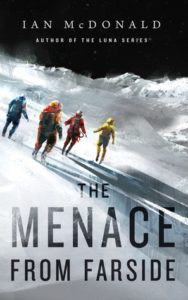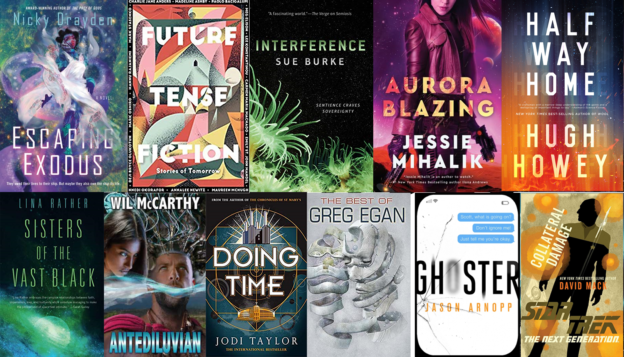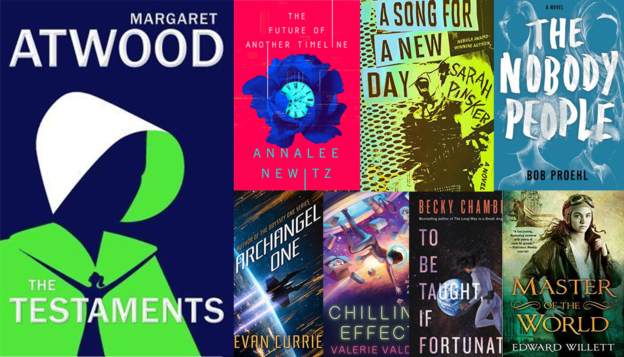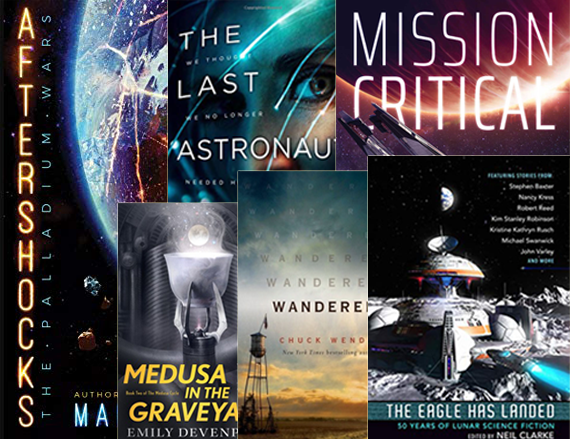(This column appeared on the Amazing Stories website 9/5/2019 > Link)
September promises a rich harvest of end-of-summer reading for science fiction fans. You can start off your month with Evan Currie’s mil-sf-space opera, Archangel One and some paranormal tales with The Nobody People by Bob Proehl and Dave Hutchinson’s The Return of the Incredible Exploding Man, then go on to a fine piece of hard-sf with Becky Chambers new novella To Be Taught, If Fortunate. If you’re interested in a post-apocalypse with a soundtrack, I strongly recommend A Song for a New Day by Sarah Pinsker, and unless you’ve been living under a rock you know that Margaret Atwood’s sequel to The Handmaids Tale, The Testaments, is out this month on the 10th. If that’s too heavy for you, Master of the World (Worldshapers #2) by Edward Willett is a Vernian steampunk bit of world-hopping. Or you might settle in with either of two excellent and thought-provoking books that round out the month: Gamechanger by L.X. Beckett, or Annalee Newitz’s second novel and one of the best time travel stories I’ve read, The Future of Another Timeline…and there are still more worth looking at in Other Recommendations.
—
 Archangel One by Evan Currie
Archangel One by Evan Currie
9/1/2019 (47North)
If you like mil-sf-space opera, Evan Currie is one of the best in the field, and his long-running Odyssey One series gets a new branch this month with Archangel One, which longtime readers will recognize at the call-sign of Eric Weston, now fleet commander for Earth’s forces in their fight against the Empire that has threatened both Earth and its Primae allies. Now, Commander Stephen Michaels leads the Archangels on a covert mission into the Empire as mercenaries in order to gain intel on the enemy. If they’re compromised, it could lead to the end of the fragile truce Eric has hammered out, with devastating consequences, but if they succeed it might end the war. Fans of Star Wars, especially those of the recent Star Wars: Alphabet Squadron, should really enjoy this one.
—
 The Nobody People: A Novel by Bob Proehl
The Nobody People: A Novel by Bob Proehl
9/3/2019 (Del Rey Books)
Bob Procehl’s new novel is a more deeply-realized telling of the “mutants with powers” story than the X-Man saga, with a tone that harks back to tales like A.E. Van Vogt’s Slan, or Nancy Kress’ Beggars in Spain by an author with terrific storytelling ability. Bishop was one of the engineers working on the first atomic bomb when he realized he had paranormal abilities that set him apart from normals. He wasn’t alone, and as time went by there were more and more like him, with the curve trending upwards. They’ve been hiding in plain sight, but the secret is bound to come out, so Bishop recruits Avi Hirsch, a more-or-less washed-up war correspondent, to tell their story to the world. He wants to use Avi, but even more important is Avi’s daughter, whose powers as a ‘Resonant’ are just emerging. The Nobody People does the setup for what’s probably a trilogy but handles its part of the arc with satisfying completeness.
—
 The Return of the Incredible Exploding Man Dave Hutchinson
The Return of the Incredible Exploding Man Dave Hutchinson
9/3/2019 (Solaris)
Dave Hutchinson, author of the Fractured Europe series, features another washed-up journalist, Alex Dolan, in the collision of two SF subgenres – What could possibly go wrong when you turn on the worlds biggest supercollider and paranormal powers stories. If you’re familiar with either the graphic novel or film version of the Watchmen, things lead up to a Doctor Manhattan origin story and then chart their own course. Alex isn’t at all sure he wants to be writing the story of a billionaire that bought himself a town in the Midwest to build a really big science project, but he’s broke and the money is good. Also, there’s something weird going on in the refurbished town of Sioux Falls, and not just the Stepford WIves vibe from the happy residents. Something weird is here and has been long before the supercollider came to town. The writing is excellent, but the mystery unfolds fairly slowly and things don’t get really science-fictional until three-quarters of the way through. Things come to a head in the end, but there’s not a lot of resolution, so we’re left wondering if this is a series or just a comment on the post-human condition. Either way, it’s a good read.
—
 To Be Taught, If Fortunate by Becky Chambers
To Be Taught, If Fortunate by Becky Chambers
9/3/19 (Harper Voyager)
If you missed Becky Chambers Wayfarers series, which just won a Hugo Award in Dublin, you might start your acquaintance with this talented author with her new novella, To Be Taught, If Fortunate, which is an excellent tale of planetary exploration told in a hard sf voice with reflections on where we’re going in space and what we should/will do when we get there. Four astronauts wake from hibernation, which slows but doesn’t stop their aging, to explore a series of planets, each with vastly different challenges. The story is told by Ariadne, the mission’s engineer/pilot, and though she’s not a science specialist, Ariadne is as committed and engaged as the others, pulling them together in times of crisis and out of their heads when they get too stuck. This would make an excellent Netflix/Amazon series, as the group deals with their isolation from Earth and keeping the worlds they visit isolated from themselves. In the end, it’s also a referendum on human exploration in space, and all in all an excellent piece of hard sf that doesn’t skimp on the characters. By the way, we’re showing the US cover, which looks sadly amateurish to me, but the UK version is much nicer.
—
 A Song for a New Day by Sarah Pinsker
A Song for a New Day by Sarah Pinsker
9/10/19 Berkley
What would a month be without a good apocalypse? Author/Musician Sara Pinkser calls on her combined talents to tell this story about the day (live) music died in America, killed off by anti-gathering laws after a series of terrorist and epidemic events, and replaced by holographic concerts and big media domination. There are two main characters, Luce, who was a rising star when the troubles started, and Rosemary who was only 12. Now it’s a decade or so later and they’re on a collision course that will change both of them, and just maybe the rest of us as well. Set largely in Baltimore, the author’s home city, it conjures up a vivid picture of both the town and a world where music has gone underground and people are afraid of any contact with others. If you’ve read Asimov’s Naked Sun, you’ll recognize the beginnings of the agoraphobic civilization he portrayed there. I enjoyed this a lot, even the endnotes, which I read while listening to the author on Spotify, which was oddly like listening to music while watching movie credits.
—
 Master of the World (Worldshapers #2) by Edward Willett
Master of the World (Worldshapers #2) by Edward Willett
9/10/19 (Daw Books)
If you like your steam-punk with a Jules Verne flavor, Master of the World is what you’re looking for. It’s the second book in Edward Willett’s series where a handful of gifted ‘shapers” can create pocket universes to their liking, among them our hero, Shawna Keys. Don’t worry if you missed the first book, as Shawna catches you up in a breathless recap at the start. What’s important is that there’s a powerful shaper trying to rewrite all the realities to his vision, and Shawna has been given the mission of gathering the power from shapers across the worlds to combat him. Cut off from her own world, as well as the guide who was sent to help her, she’s got to find this world’s shaper and convince them to help her. Fortunately, Shawna is well-read in Jules Verne’s classics, as she finds herself in the midst of a world playing out his best known, and a few less-known, works. The series promises to be something of a mashup between Sliders and Le Guin’s Lathe of Heaven as Shawna hops from reality to reality in hopes of thwarting the Adversary.
—
 The Testaments by Margaret Atwood
The Testaments by Margaret Atwood
9/10/19 Nan A. Talese
When Margaret Atwood gave us the dystopian The Handmaid’s Tale (1985), it became a fixture of feminist literature, though the author points out that men are limited in this dystopia as well. Now, nearly thirty-five years later, its reputation has only grown, spawning a film adaptation (1990) and a web-streaming series on Hulu (now in its 3rd season). It’s also getting a sequel, The Testaments, set fifteen years after Offred’s escape attempt from the repressive and theocratic Gilead regime where she was held as property for her ability to breed after a sterility epidemic. In the end, the book left a lot of things unanswered with the revelation that it had been unearthed as a recording and was being reviewed by a history class. Did Offred get away? Did the regime fail, or change, and did the fertility crisis pass? Well, here we are waiting for the sequel, which despite the security surrounding it, has been listed for the Booker Prize, one of the most prestigious awards in English Literature. We do know that the book does not follow on from the web series and that there are several female voices telling the story, but as far as I know, it hasn’t been revealed whether Offred’s is one of them. This is clearly a major literary event, with bookstore parties set for the unboxing on 9/10, but I’m looking forward to seeing how science fiction readers react and whether time has dulled our ability to be shocked or made us all too aware of how small the distance between fiction and reality is.
—
Gamechanger by L.X. Beckett
9/17/19 (Tor Books)
L.X. Becket takes us just far enough down the timestream to engage with humanity getting itself back on its feet and curing the planet of the excesses of the “late twenty-first century.” Following the Setback and the Clawback, the new generation is determined to Bounceback, and not to make the same mistakes again. In the novel, internationally-acclaimed VR gamer and sometime-lawyer Cherub “Rubi” Whiting takes on Luce, Luciano Pox, a possible hacker and terrorist that the government wants to shut down. Luce’s identity, even his humanity, is one of the central mysteries of the book, and there’s a large cast of power players to complicate things. It’s as full of interesting ideas as a Neal Stephenson novel, as well as unrelenting in its take on climate change, food insecurity, our obsession with social media, and the black hole VR could become for us all.
—
 The Future of Another Timeline by Annalee Newitz
The Future of Another Timeline by Annalee Newitz
9/24/19 (Tor Books)
Annalee Newitz’s first novel, Autonomous, established her as a rule-breaking author to keep an eye on. The Future of Another Timeline marks her as one of the most important new voices in science fiction. It’s one of the best feminist-time-travel-alt-history(ies) novel to come along in this timeline, either in each category or all at once. The story revolves around two main characters, Beth, a punk rocker about to embark on college when her best friend turns into a vigilante killing male abusers, and Tess, a traveler from the future who’s part of The Daughters of Harriet, a small group trying to stop a group of men trying to destroy end time-traveling and strip women of their rights, creating a static timeline. Beth and Tess are bound together across time and Tess is torn between her mission to stop the saboteurs and to prevent the future Beth is heading for, a future she’s already lived through. Meddling in your own past has terrible consequences, but Tess’ knowledge of what’s to come drives her to action no matter the cost. This is possibly the best time travel novel since Connie Willis’s books, and it’s full of fresh ideas, including a world aware that time-travel exists, and in fact pre-dates mankind, and that the past, present, and future may be set in stone, but stones can shift. There’s a lively discussion of the “Great Man” versus “Collective” theories of social change that Asimov would have loved, and if I had a time machine I’d send this back in time 50 years or so to watch science fiction readers and the emergent wave of feminists try to wrap their heads around it.
Other Recommendations
—
 Once Upon a Parsec by David Gullen, Ed. 9/3/19 – Science fiction should be about exploring other points of view, which is what the collection of stories David Gullen has put together does brilliantly through the lens of “alien” fairy tales.
Once Upon a Parsec by David Gullen, Ed. 9/3/19 – Science fiction should be about exploring other points of view, which is what the collection of stories David Gullen has put together does brilliantly through the lens of “alien” fairy tales.
Nary a fairy among them, as far as I could tell, but quite a few examples of how fact becomes legend, and legend becomes a myth. Humans feature in a number of the tales, but always as the other.
—
 Lost and Found by Scott Card 9/10/19 (Blackstone Publishing) – Fourteen-year-old Ezekiel has a micropower — the ability to find lost things. More often than not this gets him into trouble as he returns them to their owners and has to convince them he’s didn’t steal them in the first place. Finding lost bikes and other things is one thing, but when Ezekiel comes to the attention of a police detective working the case of a missing girl, his power will be put to the test. This sounds like a fun YA from someone who’s able to write young characters.
Lost and Found by Scott Card 9/10/19 (Blackstone Publishing) – Fourteen-year-old Ezekiel has a micropower — the ability to find lost things. More often than not this gets him into trouble as he returns them to their owners and has to convince them he’s didn’t steal them in the first place. Finding lost bikes and other things is one thing, but when Ezekiel comes to the attention of a police detective working the case of a missing girl, his power will be put to the test. This sounds like a fun YA from someone who’s able to write young characters.
—
 Lost Transmissions: The Secret History of Science Fiction and Fantasy by Desirina Boskovich 9/10/19 (Adams) – This is a weird and wonderful collection of science fiction and fantasy artifacts that never quite saw the light of day.
Lost Transmissions: The Secret History of Science Fiction and Fantasy by Desirina Boskovich 9/10/19 (Adams) – This is a weird and wonderful collection of science fiction and fantasy artifacts that never quite saw the light of day.
William Gibson’s never-filmed Aliens sequel, Philip K. Dick’s metaphysical diary (with photographs), a lost novel from Jules Verne, and lots more in sections divided into Film & TV, Literature, Art, Music, Fashion, Architecture, and Pop Culture. Not just non-fiction…it’s meta-fiction.
—
 The Institute by Stephen King 9/10/19 (Scribner) – Considering Ender’s Game, the Halo saga, and The Umbrella Academy, science fiction has a rich history of borrowing, stealing, or buying kids from their homes for advanced programs, but leave it to Stephen King to abduct them, kill their parents in their beds, and whisk them off to The Institute. It’s as if Professor Xavier was running a prison for Exceptional Children, and training them to use their talents for dark purposes. It may or may not be your thing, but nobody tells a story like King.
The Institute by Stephen King 9/10/19 (Scribner) – Considering Ender’s Game, the Halo saga, and The Umbrella Academy, science fiction has a rich history of borrowing, stealing, or buying kids from their homes for advanced programs, but leave it to Stephen King to abduct them, kill their parents in their beds, and whisk them off to The Institute. It’s as if Professor Xavier was running a prison for Exceptional Children, and training them to use their talents for dark purposes. It may or may not be your thing, but nobody tells a story like King.
—
 Menace of the Monster by Mike Ashley, ed 9/12/19 (British Library Publishing) – Ten classic short stories from H.G. Wells, Ray Bradbury and J.G. Ballard, as well as some less well-known authors of golden age science fiction share the fear of the other from one side of the lens or the other. Martians and Venusian’s consider life on Earth, and in other stories, we look back at them. It should be an interesting survey, but sadly it lacks my favorite, William Tenn’s The Flat Eyed Monster (1955) which would certainly have qualified.
Menace of the Monster by Mike Ashley, ed 9/12/19 (British Library Publishing) – Ten classic short stories from H.G. Wells, Ray Bradbury and J.G. Ballard, as well as some less well-known authors of golden age science fiction share the fear of the other from one side of the lens or the other. Martians and Venusian’s consider life on Earth, and in other stories, we look back at them. It should be an interesting survey, but sadly it lacks my favorite, William Tenn’s The Flat Eyed Monster (1955) which would certainly have qualified.
—
 Chilling Effect by Valerie Valdes 9/17/19 (Harper Voyager) – Captain Eva Innocente and the crew of La Sirena Negra are your classic rag-tag bunch of ne’er-do-wells skirting the edge of the law. Things get more complicated than usual when Eva becomes the desired object of affection for a galactic warlord while learning that her sister has been kidnapped by the equivalent of the mob and that she has to run their increasingly dangerous errands, ‘less something should happen to her sister. Eva lies to her crew, lusts for her scaly alien engineer, and generally runs headlong into trouble. Something should have a chilling effect on her, but nothing much seems to.
Chilling Effect by Valerie Valdes 9/17/19 (Harper Voyager) – Captain Eva Innocente and the crew of La Sirena Negra are your classic rag-tag bunch of ne’er-do-wells skirting the edge of the law. Things get more complicated than usual when Eva becomes the desired object of affection for a galactic warlord while learning that her sister has been kidnapped by the equivalent of the mob and that she has to run their increasingly dangerous errands, ‘less something should happen to her sister. Eva lies to her crew, lusts for her scaly alien engineer, and generally runs headlong into trouble. Something should have a chilling effect on her, but nothing much seems to.
—
 World Engines by Stephen Baxter 9/19/19 (Gollancz) – 500 years before, astronaut Reid Malenfant went off to explore a strange object known as the Kernel, and it took him to the ends of the universe, as Baxter told us in the Manifold series. Reid’s wife Emma never stopped hoping he’d return, or at least be found. Now in 2570, the Kernel returns, and with it a cryogenically-preserved Malenfant. I expect this follows on from the Manifold trilogy, but since that was three alternate versions of Reid’s adventure it’s hard to say.
World Engines by Stephen Baxter 9/19/19 (Gollancz) – 500 years before, astronaut Reid Malenfant went off to explore a strange object known as the Kernel, and it took him to the ends of the universe, as Baxter told us in the Manifold series. Reid’s wife Emma never stopped hoping he’d return, or at least be found. Now in 2570, the Kernel returns, and with it a cryogenically-preserved Malenfant. I expect this follows on from the Manifold trilogy, but since that was three alternate versions of Reid’s adventure it’s hard to say.
—
 American Science Fiction: Eight Classic Novels of the 1960s, Volumes 1 & 2 GARY K. WOLFE, ED. 9/24/19 (Library of America) – Following his collection for the 1950s, Gary Wolfe has selected eight novels from the 1960s, a time “when writers who had started their careers in the 1930s or 1940s produced some of their finest mature work.” As their work matured it also got longer, constraining what he could include in a manageable collection. Though I’m familiar with all the first volume, there’s much in the second I haven’t read, but considering the quality of the first, I’m looking forward to it. Volume 1: The High Crusade • Poul Anderson, Way Station • Clifford D. Simak, Flowers for Algernon • Daniel Keyes, . . . And Call Me Conrad [This Immortal] Roger Zelazny Volume 2: Past Master • R. A. Lafferty, Picnic on Paradise • Joanna Russ, Nova • Samuel R. Delany, Emphyrio • Jack Vance
American Science Fiction: Eight Classic Novels of the 1960s, Volumes 1 & 2 GARY K. WOLFE, ED. 9/24/19 (Library of America) – Following his collection for the 1950s, Gary Wolfe has selected eight novels from the 1960s, a time “when writers who had started their careers in the 1930s or 1940s produced some of their finest mature work.” As their work matured it also got longer, constraining what he could include in a manageable collection. Though I’m familiar with all the first volume, there’s much in the second I haven’t read, but considering the quality of the first, I’m looking forward to it. Volume 1: The High Crusade • Poul Anderson, Way Station • Clifford D. Simak, Flowers for Algernon • Daniel Keyes, . . . And Call Me Conrad [This Immortal] Roger Zelazny Volume 2: Past Master • R. A. Lafferty, Picnic on Paradise • Joanna Russ, Nova • Samuel R. Delany, Emphyrio • Jack Vance
—
About my process and The Usual Suspects
For the most part, this list sticks to what appeals to me as science fiction, about which I’m willing to be fairly flexible, but if here there be dragons, you can expect to find some tweaked DNA to explain it. I make up this list based on what I’ve read, what I heard and what I’m looking forward to. Quite a few will wind up getting full-length reviews here or around the web, especially at SFRevu.com where I’m editor emeritus.
You can find me on Facebook at @Ernest Lilley or on my blog @ beingErnest
Since I’m often done with this after the beginning of the month, I do check what I consider to be the usual suspects, but mainly to see if they agree with my picks, which oddly enough, they more or less do. You might check them out at:
 The Menace from Farside (Luna) by Ian McDonald
The Menace from Farside (Luna) by Ian McDonald











 Lost and Found
Lost and Found Lost Transmissions: The Secret History of Science Fiction and Fantasy
Lost Transmissions: The Secret History of Science Fiction and Fantasy The Institute
The Institute Menace of the Monster
Menace of the Monster Chilling Effect
Chilling Effect World Engines
World Engines American Science Fiction: Eight Classic Novels of the 1960s, Volumes 1 & 2
American Science Fiction: Eight Classic Novels of the 1960s, Volumes 1 & 2
